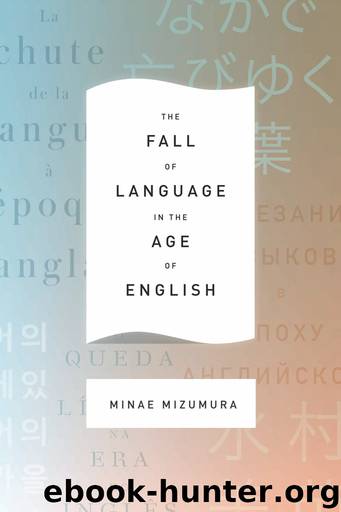The Fall of Language in the Age of English by Yoshihara Mari Carpenter Juliet Winters Mizumura Minae

Author:Yoshihara, Mari, Carpenter, Juliet Winters, Mizumura, Minae [Mizumura, Minae]
Language: eng
Format: epub
Tags: LIT008030, LITERARY CRITICISM / Asian / Japanese, LIT004020, LITERARY CRITICISM / American / General
Publisher: Columbia University Press
Published: 2008-06-08T16:00:00+00:00
5. THE MIRACLE OF MODERN JAPANESE LITERATURE
Universities and creative geniuses may seem strange bedfellows when it comes to art, including literature. Of course, plenty of universities nowadays offer courses on creative writing that are taught by acclaimed writers. Yet the romantic in us wants to believe in geniuses who dwarf the annoyingly erudite in their ivory towers. That romantic belief harks back to the golden age of national literature, an age when literature was separated from academic disciplines and transcended them as a source of knowledge. But in non-Western countries, universities had to play a crucial role in creating a national literature—however unromantic the fact may be. Genius was not enough.
The previous chapter was devoted to the discussion of three conditions that enabled the rapid establishment of the national language in Japan after the Meiji Restoration: a mature written language when the country was still part of the Sinosphere, a robust print capitalism during the preceding Edo period, and freedom from Western colonization at a time when nearly all the non-West was colonized. We will begin this chapter by first directing our attention to something that was made possible only by the last of the three: Japan’s founding of its own universities.
First, let us revisit the question of what might have happened to the Japanese language if Japan had become a colony of the United States. Quite assuredly, the Japanese universities we now know, where classes are taught in Japanese as a matter of course, would never have existed. The children of the wealthy would have crossed the Pacific to study in American universities, and other bright youths would have been selected in large numbers to do the same. Sooner or later, universities would surely have sprung up on Japanese soil, but the courses would have been taught in English. (When Japan founded universities in its colonies, Taiwan and Korea, the courses were taught in Japanese.) Only the escape from colonization allowed Japan to build its own universities, which, in turn, made it possible for Japanese people to pursue knowledge in their own language.
Nothing better illuminates the truth of this statement than the fact that, at the outset, most university courses in Japan were not taught in Japanese by Japanese professors. Universities erected brick buildings modeled on Western architecture and purchased mounds of leather-bound books from the West, but no Japanese could teach the necessary subject matter of “Western learning”—the Western academic disciplines. Universities therefore hired foreign teachers, turning not just to qualified Westerners already residing in Japan but also to scholars from afar. These teachers were considered so invaluable that many are said to have earned more than cabinet members. Only gradually were they laid off and replaced by Japanese back from studying in the West. And it was when such returnees began teaching in their own language what they had learned abroad that the Japanese language began transforming into a language in which the pursuit of knowledge was legitimately possible—that is, into a national language not only in name but also in practice.
Download
This site does not store any files on its server. We only index and link to content provided by other sites. Please contact the content providers to delete copyright contents if any and email us, we'll remove relevant links or contents immediately.
4 3 2 1: A Novel by Paul Auster(12363)
The handmaid's tale by Margaret Atwood(7750)
Giovanni's Room by James Baldwin(7316)
Asking the Right Questions: A Guide to Critical Thinking by M. Neil Browne & Stuart M. Keeley(5751)
Big Magic: Creative Living Beyond Fear by Elizabeth Gilbert(5745)
Ego Is the Enemy by Ryan Holiday(5409)
The Body: A Guide for Occupants by Bill Bryson(5072)
On Writing A Memoir of the Craft by Stephen King(4925)
Ken Follett - World without end by Ken Follett(4718)
Adulting by Kelly Williams Brown(4562)
Bluets by Maggie Nelson(4542)
Eat That Frog! by Brian Tracy(4513)
Guilty Pleasures by Laurell K Hamilton(4437)
The Poetry of Pablo Neruda by Pablo Neruda(4089)
Alive: The Story of the Andes Survivors by Piers Paul Read(4017)
White Noise - A Novel by Don DeLillo(3999)
Fingerprints of the Gods by Graham Hancock(3983)
The Book of Joy by Dalai Lama(3968)
The Bookshop by Penelope Fitzgerald(3841)
